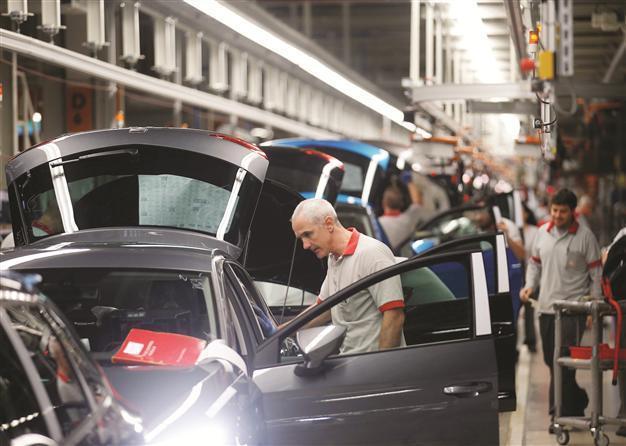Spanish car producers look beyond low labor costs to maintain boom
MARTORELL - Reuters

Workers assemble vehicles on the assembly line of the SEAT car factory in Martorell. Spanish assembly plants keep boosting production and creating new jobs amid ongoing suffer in their European counterparts.
While much of the European car industry is in dire straits, Spanish assembly plants are raising production, winning new models and creating jobs despite years of recession.But Spanish manufacturers must expand into research and development while the state needs to improve transport links, despite its deep financial problems, if Spain is to remain Europe’s second-biggest carmaker and beat lower cost rivals such as the Czech Republic, industry officials say.
At the moment, at least, the outlook is bright.
At the Martorell plant near Barcelona, headquarters of the Volkswagen-owned Spanish brand SEAT where production rose seven percent last year, workers assemble five different models on a moving carousel. “Nobody talks about lay-offs here, nor has anyone been fired,” said assembly line worker Pedro Pastor. “In contrast, a lot of my friends are on the dole and can’t find work.”
Just as Mexico has a thriving motor industry making vehicles for much of the Americas, its Spanish counterpart is prospering despite the depressed domestic economy by keeping labor costs down and targeting stronger European markets.
A six-year sales slump and aggressive discounting across much of continental Europe have badly hurt mid-range manufacturers. PSA Peugeot Citroen, one of the worst affected which lost 5 billion euros ($6.73 billion) last year, said on Nov. 21 it may close an assembly line at its Mulhouse plant in eastern France unless production picks up.
Martorell, which makes the top-selling SEAT Ibiza and Leon models, illustrates the robust state of Spain’s car industry. Spain’s biggest export market is France, which is showing signs of a sales recovery, followed by Germany which avoided the worst of the euro zone crisis and relatively buoyant Britain.
The industry created over 2,400 Spanish jobs in the first six months of this year as foreign firms including Ford and even Peugeot Citroen opened production lines, investing 3.5 billion euros in just over a year. With Spanish unemployment at 26 percent, unions keen to protect jobs have accepted flexible work practices and salary freezes, which together with close links to a world-class domestic car parts industry have helped to attract the orders.
Spain has no domestically-owned car makers - Volkswagen bought SEAT from the state in 1986 - but the overall industry accounts for 10 percent of economic output and employs 9 percent of the workforce.
Unions lead the way
Spanish car industry wages are around the European average and similar to those in Italy. However, the unions have led the way in agreeing to practices such as their members working more hours when a big order comes through, and then taking time off owed to them when assembly lines lie idle.
“Spanish unions are signing the best collective bargaining contracts in Europe with multinational companies,” Treasury Minister Cristobal Montoro told Reuters this week.
Unions have adopted measures that would have been unthinkable a few years ago, such as twin-track salary scales where new workers get paid less for doing the same job as existing employees.
Many of these measures, like deciding collective wage agreements at each company rather than across the entire industry, have become enshrined in law by the center-right government’s labour reform last year.
















